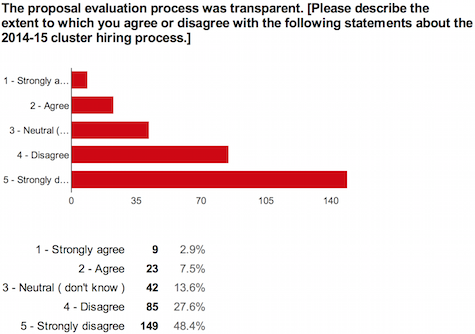Jim Bean’s Five Big Ideas, Gottfredson’s clusters-of-excellence, interdisciplinary super-modularity, etc. UO’s administration has a long history of buzzword inspired efforts to take control of faculty hiring away from the faculty and academic departments. They get these ideas from the same bullshit conference powerpoint presentations and “talent management consultants” as every other university does. But now some faculty are fighting back.
Insidehighered.com has a report on the UC-Riverside Senate’s fight to replace their administration’s hubris with some straightforward academic rigor, here:
… While the first wave of clusters already has been approved, the recruitment process is still happening. Part intervention, part response to faculty concerns, the Riverside division of the Academic Senate recently surveyed its members on their views of the initiative thus far. The results were released to faculty members earlier this month, and Inside Higher Ed obtained a copy. A little less than half the faculty — some 330 professors — responded, indicating a high level of interest in the matter. The idea is that the body will use the responses to offer constructive feedback and guidance to the administration in the coming weeks.
Here’s what the survey found. First, most respondents — 82 percent — said their departments already had strategic hiring initiatives in place before the clusters. Some 49 percent of all departments have been able to fill all open positions on their own.
Most of the respondents either agreed that or were neutral as to whether there was sufficient time to prepare cluster proposals (41 percent of respondents were not involved in any proposal). But 72 percent of respondents either disagreed or strongly disagreed that criteria for proposals were clear.
As to the proposal evaluation process, 76 percent disagreed or strongly disagreed that it was transparent. Just 14 percent of respondents agreed or strongly agreed that the feedback they received on their proposals was appropriate, compared to 45 percent who disagreed or strongly disagreed (the rest were neutral).

Some 46 percent of respondents disagreed or strongly disagreed that the provost’s appointed steering committee for the initiative did a good job, compared to the 14 percent who had a positive view (40 percent were neutral). Nearly half of respondents disagreed or strongly disagreed that members of the selection panel knew enough to properly assess proposals.
Perhaps most importantly, the overwhelming majority of respondents — 69 percent — disagreed (over half of them strongly) that the cluster-hiring strategy “is an innovative and appropriate replacement for the traditional departmental hiring strategy.” Most said their own departments’ hiring strategies were inconsistent with the cluster strategy; over half said the cluster strategy interfered with their departments’ strategies.
As a start, we could survey faculty on how much control they feel they have, over ALL aspects of quality in their unit. How many believe the administration runs the university, and not the faculty? How many would characterize the hierarchy of managers as making important decisions without faculty collaboration? How many feel their administrators act against the pedagogical or public-service mission, or the needs of people? Of course this differs from unit to unit. So, we need surveys to map the extent and location and quality of bureaucratic overreach.
My survey response
I have ZERO control.
I suffer hourly under bureaucratic overreach.
I’ve been saying similar things here about the cluster hiring program. Why are we still operating under the plans of Michael Gottfredson, of all people?
And the rapid hiring here, especially cluster hiring, is occurring under very straitened financial circumstances (at least for CAS) which haven’t been explained. And with completely inadequate infrastructure, as recent commenters including myself have pointed out.
Why is there so much mystery surrounding the CAS deficit? Why are the Board and the current President pushing this without a corresponding upping of the game when it comes to resources (financial, infrastructure, and other)?
To state the obvious: it comes down to Jamie Moffitt, as VPFA. The CAS budget problems are above CAS. The clusters are funded centrally. The mysterious subsidizing of the Law School, if it’s happening, is happening centrally. The lack of financial oversight over UOPD, the lack of transparency, all this comes down to Jamie Moffitt. Whether it results from incompentence, just fear of criticism, or simple personal insecurity, all of campus is operating in a vacuum of information about financial matters because the VPFA won’t or can’t provide data and explain. It’s destructive, and needs to stop.
While I agree with Cat that there is a large grain of Truth to the blame of the VFPA – CAS has not done itself any favors with some ridiculous budget sweep policies of Gordon Taylor – but the biggest problem to me is the total lack of transparency (possibly competence) within the CAS leadership – a lot of times they simply blame the CBA and then give two different answers to the same question within a week. Makes one simply give up.
I thought finances were dictated by the all-holy Budget Model of the Week (BMoW)? Adjusted by Central (aka Provost/Pres) based on special requests? Handed down from on high to CAS, who takes what they are given and passes on the thin gruel to programs regardless of loss of quality or quantity?
CAS Dean cannot explain, and Central will not explain, and the local administration of the squeeze is just thoughtless at best, if not a little sadistic.
In Athletics, we’ve been spending double digit budget increases for years. 2016 Budget Champions!